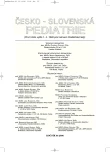-
Medical journals
- Career
Progressive Familial Intrahepatic Cholestasis – Manifestations and Diagnosis in Infancy
Authors: R. Kotalová 1; D. Cebecauerová 2,3; A. S. Knisely 3; M. Hřebíček 4; M. Jirsa 2
Authors‘ workplace: Laboratory of Experimental Hepatology CEM IKEM, Prague Head MUDr. Mgr. M. Jirsa, CSc. 2; Department of Paediatrics, Charles University, nd Faculty of Medicine, Prague Chair prof. MUDr. J. Vavřinec, Dr. Sc. 2; Institute of Liver Studies, King’s College Hospital, London, UK 3; Institute of Inherited Metabolic Diseases, Charles University, 1st Faculty of Medicine, Prague Chair prof. MUDr. M. Elleder, Dr. Sc. 4
Published in: Čes-slov Pediat 2006; 61 (4): 200-206.
Category: Case Report
Overview
Progressive familial intrahepatic cholestasis (PFIC) is the common name for the group of inherited autosomal recessive cholestatic liver diseases of infancy and childhood caused by defects in genes encoding canalicular proteins involved in handling of phospholipids and bile salts. The first case in the Czech Republic of PFIC confirmed at the molecular level and resulting from defects in ABCB11, encoding bile salt export pump (PFIC type 2), is reported in this paper. The case is presented in the context of the differential diagnosis of neonatal cholestasis with low serum concentrations of gamma-glutamyl transpeptidase activity.
Key words:
progressive familial intrahepatic cholestasis, bile salt export pump, ursodeoxycholic acid
Labels
Neonatology Paediatrics General practitioner for children and adolescents
Article was published inCzech-Slovak Pediatrics

2006 Issue 4-
All articles in this issue
- Low-dose Technique of Spiral CT of the Lungs in the Diagnostics of Metastatic Focal Findings in Children and Adolescents
- TNF G-308A Polymorphism in Children with Nephrotic Syndrome
- Methylmalonic Acidemia: Clinical, Biochemical and Molecular Biological Study
- Progressive Familial Intrahepatic Cholestasis – Manifestations and Diagnosis in Infancy
- Heiner Syndrome (Pulmonary Hemosiderosis Induced by Allergy to Cow’s Milk Proteins)
- Immune System in Patients with Cystic Fibrosis. Is Everything Normal?
- Czech-Slovak Pediatrics
- Journal archive
- Current issue
- Online only
- About the journal
Most read in this issue- Methylmalonic Acidemia: Clinical, Biochemical and Molecular Biological Study
- Heiner Syndrome (Pulmonary Hemosiderosis Induced by Allergy to Cow’s Milk Proteins)
- Low-dose Technique of Spiral CT of the Lungs in the Diagnostics of Metastatic Focal Findings in Children and Adolescents
- Progressive Familial Intrahepatic Cholestasis – Manifestations and Diagnosis in Infancy
Login#ADS_BOTTOM_SCRIPTS#Forgotten passwordEnter the email address that you registered with. We will send you instructions on how to set a new password.
- Career

